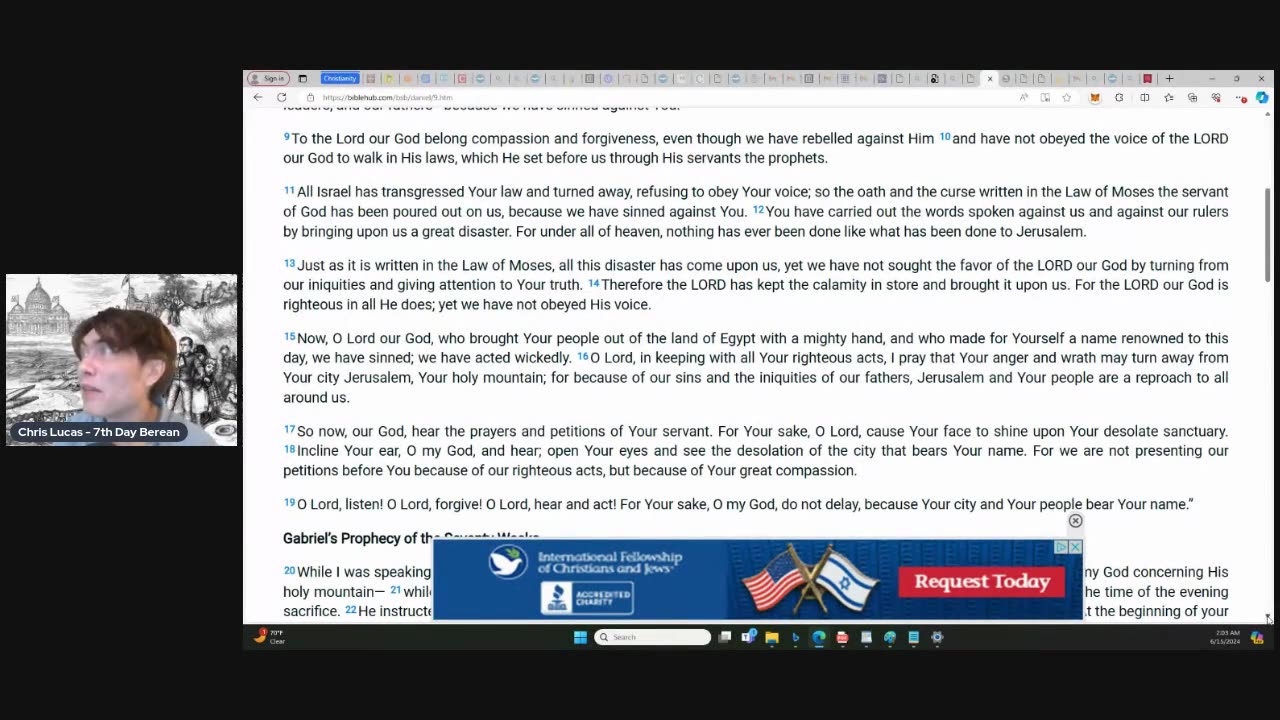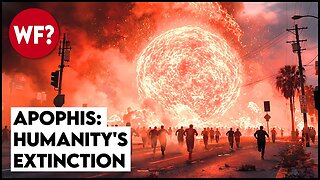Premium Only Content

Daniel 8 - Hebrew Grammar PROVES 7th Day Adventists and King James Onlyism is WRONG (edited)
440 views Streamed live on Jun 15, 2024
Hebrew Text: וּמַרְאֵ֨ה הָעֶ֧רֶב וְהַבֹּ֛קֶר אֲשֶׁ֥ר נֶאֱמַ֖ר אֱמֶ֣ת ה֑וּא וְאַתָּה֙ סְתֹ֣ם הֶֽחָזֹ֔ון כִּ֖י לְיָמִ֥ים רַבִּֽים׃
English Translation: and the vision (of) the evening and the morning which was told true it is, and you seal up, the vision for many days to come
--------------------------------------------------------------
In Biblical Hebrew, the plural form is often used to indicate multiple instances or a collective concept. If the author of Daniel intended to refer to many days, one might expect the plural forms "עֲרָבִים" (aravim) for evenings and "בְּקָרִים" (bekarim) for mornings.
However, the text does not use these plural forms; instead, it uses the singular forms "עֶרֶב" (erev) for evening and "בֹּקֶר" (boker) for morning, which typically refer to the actual times of day. This choice suggests a counting of specific instances—2300 instances of the evening and morning sacrifices—rather than a general reference to time periods.
**Symbolic Interpretation vs. Literal Events**:
While symbolic interpretation is a valid approach to prophetic texts, it requires clear textual markers or historical precedent. The use of "evening and morning" elsewhere in the Bible, particularly in the creation account in Genesis, consistently denotes a literal day. There is no biblical precedent for interpreting "evening and morning" as symbolic of years, especially without explicit textual justification.
--------------------------------------------------------------
In Biblical Hebrew, the plural form is often used to indicate multiple instances of something. So if the text in Daniel 8:14 were referring to multiple, separate periods of light and dark, it would likely use the plural forms “boqerim” (בֹּקְרִים) for mornings and “erevim” (עֲרָבִים) for evenings.
The use of the singular forms “boqer” (בֹּקֶר) and “erev” (עֶרֶב) in the phrase “erev boqer 2300” suggests a count of sacrificial cycles (one evening and one morning sacrifice) rather than a count of days or periods of light and darkness. This interpretation supports the idea that the passage is specifically referencing the Tamid sacrifices, which were a central part of the daily ritual in the Temple.
In the context of Daniel 8:14, “erev boqer 2300" uses the singular forms of “evening” and “morning” followed by the number 2300. This construction is distinct from “2300 erevim boqerim,” which would use the plural forms of the nouns. The singular form in the original text suggests a count of sacrificial cycles, each consisting of one evening and one morning sacrifice, rather than a count of literal days or periods of light and darkness.
The choice to use the singular forms “erev” and “boqer” followed by the numeral 2300 emphasizes the continuity and regularity of the sacrifices. It aligns with the interpretation that the passage is referencing the Tamid sacrifices without needing to repeat the term “Tamid” since it has already been established in the preceding verses
If the intention in Daniel 8:14 was to refer to literal evenings and mornings, the Hebrew text would likely have used the plural forms “boqerim” (בֹּקְרִים) for mornings and “erevim” (עֲרָבִים) for evenings, and the number 2300 would precede these nouns. This would be consistent with Hebrew grammar rules, where the numeral typically agrees with the noun in gender and number, and for numbers greater than ten, the numeral is followed by either the singular or the plural form of the noun.
The actual phrase “erev boqer 2300” uses the singular forms and places the number after the nouns, which suggests a count of sacrificial cycles rather than a count of literal days. This supports the interpretation that the passage refers to the Tamid sacrifices, emphasizing the continuity and regularity of the sacrificial system rather than the mere passage of time. The singular form highlights the unit of one evening and one morning sacrifice as a single entity, a daily cycle of offerings.
In summary, the grammatical structure of the phrase in the original Hebrew text of Daniel 8:14 is a strong indicator of its intended meaning, pointing to the Tamid sacrifices rather than to literal periods of light and darkness.
The use of the singular form in both verses 14 and 26, along with the context of the preceding verses, strengthens the argument that the phrase “erev boqer 2300” is not about literal days but about the number of sacrificial cycles, each including one evening and one morning sacrifice.
Numbers 28:3-4 - “These are the gift offerings that you are to present to YHWH: As a regular burnt offering every day, two lambs in their first year without blemish. You shall offer one lamb in the morning, and the other lamb you shall offer at twilight.” Here, the Hebrew uses singular forms to refer to the daily offerings, which are part of a continual cycle.
Exodus 29:38-39 - “Now this is what you shall offer on the altar: two one-year-old lambs each day, continuously. The one lamb you shall offer in the morning, and the other lamb you shall offer at twilight.” Again, singular forms are used to describe the two daily offerings, emphasizing the regularity of the sacrifices.
Leviticus 23:37-38 - “These are the appointed feasts of the LORD, which you shall proclaim as times of holy convocation, for presenting to the LORD food offerings, burnt offerings, and grain offerings, sacrifices, and drink offerings, each on its proper day, besides the LORD’s Sabbaths.” The term “each on its proper day” uses a singular form to refer to the offerings made on individual days within the broader context of the feasts.
#######key points########
"The singular usage of 'evening and morning' in Daniel 8:26, coupled with the definite article, suggests a reference to a singular entity or concept rather than a numerical count of days. This linguistic choice aligns with the Hebrew practice of using the singular to denote a regular, ongoing action or event. In the context of the Hebrew sacrificial system, 'evening and morning' would naturally refer to the daily sacrifices, a ritual that occurs each evening and morning without fail.
The absence of a plural form in verse 26, despite the mention of 2,300 evenings and mornings in verse 14, indicates that the focus is not on the quantity of days but on the continuity of a specific ritual practice. The text seems to emphasize the disruption and eventual restoration of this daily ritual, rather than providing a tally of individual days.
Therefore, the most coherent interpretation of the singular 'evening and morning' in Daniel 8:26 is that it points to the daily ritual of sacrifices. This interpretation is substantiated by the broader scriptural context, which frequently associates 'evening and morning' with the Temple's sacrificial rites. The singular form, in this case, serves to underscore the prophetic concern with the integrity of the worship practice, rather than the passage of time."
Grammatical Detail and Technical Analysis: In Hebrew, the plural form of a noun is usually marked by the suffixes “-ים” (im) for masculine nouns and “-ות” (ot) for feminine nouns. The absence of these plural markers in Daniel 8:14 suggests that the text is not referring to multiple days in general but is instead enumerating specific instances of a ritual or event.
**Implications of Translation Choices**:
Different translations may render the Hebrew text with slight variations based on interpretive decisions. However, a close examination of the original Hebrew text reveals the grammatical nuances that are critical for understanding the intended meaning. The absence of the definite article in Daniel 8:14 and its presence in Daniel 8:26 suggests that the former is counting instances of an event, while the latter is specifying the event itself.
In Daniel 8:14, the text refers to "two thousand and three hundred evening and morning," which could be interpreted as a literal span of time. But it is not in plural form, which should cause one to wonder if it might be referring to something other than literal periods of day. Especially, when we see in Daniel 8:26, the phrase "the vision of the evening and the morning" uses the singular form, which is indeed peculiar if it were meant to denote 2,300 separate events. In Hebrew, the plural form is typically marked by specific morphological changes, which are absent in this verse.
So is it 2300 separate events, 2300 separate evenings and mornings?
Or is it referring to one event, like an evening morning sacrifice which may be defiled or halted for a period of 2300?
Conclusion: The grammatical structure of the Hebrew phrases in Daniel 8:14 and 8:26, when examined in detail and considered within their historical and ritualistic context, supports the interpretation that “2300 evenings and mornings” refers to the literal count of daily sacrifices. This interpretation is consistent with the use of Hebrew grammar, the biblical context of temple worship, and the historical practice of daily sacrifices in ancient Israel. The argument against extending this period into 2300 years is substantiated by the lack of textual indicators for a symbolic reading and the absence of scriptural precedent for such a conversion of time units. Therefore, the most coherent and textually faithful interpretation of “2300 evenings and mornings” is that it denotes the actual number of evening and morning sacrifices during the period in question. The use of singular forms in verse 14, rather than the expected plural forms for a period of days, further supports the interpretation that the focus is on the count of sacrifices rather than on a time period.
-
 1:44:48
1:44:48
The Protestant View
1 month agoThoughts on the importance of Covenants in the bible
1661 -
 34:51
34:51
The Brett Cooper Show
1 day ago $1.15 earnedWhy Are Men STILL Invading Women’s Spaces? | Episode 59
5.76K15 -
 54:32
54:32
The Why Files
11 days agoAsteroid Apophis is Coming | Ground Zero: California
50.2K183 -
 LIVE
LIVE
GritsGG
1 day ago36 Hour Stream! Most Wins 3420+ 🧠
4,945 watching -
 57:18
57:18
Dialogue works
1 day ago $0.23 earnedAndrei Martyanov: NATO is being demilitarized
110K20 -
 LIVE
LIVE
FyrBorne
12 hours ago🔴Warzone M&K Sniping: Sniping Challenges
260 watching -
 11:18
11:18
Dr Disrespect
1 day agoDr Disrespect: THE BEST AND WORST OF GAMESCOM 2025
84.8K13 -
 2:08:25
2:08:25
Side Scrollers Podcast
22 hours agoEXCLUSIVE: Marty O’Donnell BREAKS SILENCE On Bungie Drama + Kotaku Hypocrisy + MORE | Side Scrollers
31.7K5 -
 3:24:29
3:24:29
Wahzdee
4 hours agoBack on BF2042 – Which Sniper Is Actually Worth It?
3.07K1 -
 2:31:49
2:31:49
MattMorseTV
22 hours ago $0.72 earned🔴Trump's Oval Office BOMBSHELL.🔴
39.7K57